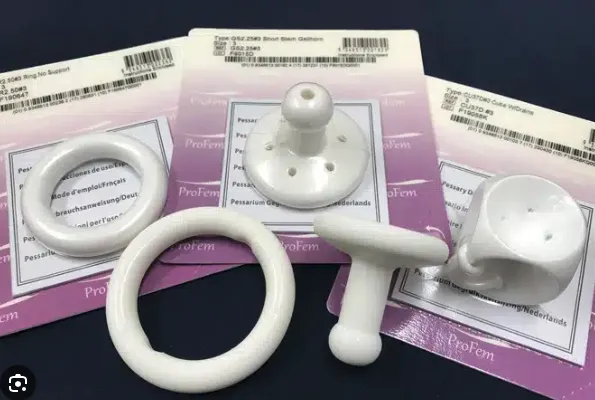Resources
Free Guides and Articles

When to see a Physio during Pregnancy

Postpartum Physio Guide: The First 6 Weeks

Free Guide:
Thriving In Menopause
Blog Articles

Pessaries
Understanding Pessaries
In the realm of women's health, especially in the field of physiotherapy, pessaries play a vital role in managing various pelvic floor conditions. If you've heard of pessaries but aren't quite sure what they are or how they work, this guide is here to provide clarity.
What is a Pessary?
A pessary is a medical device designed to support the pelvic organs and treat conditions such as pelvic organ prolapse and urinary incontinence. These conditions often occur when the muscles and ligaments in the pelvic area become weakened or stretched, leading to organs like the bladder, uterus, or rectum shifting out of place.
Why Use a Pessary?
Pessaries offer a non-surgical option for managing pelvic floor conditions. They can:
Provide support to pelvic organs, reducing symptoms of prolapse.
Help control urinary leakage by supporting the bladder neck.
Improve comfort and quality of life by addressing symptoms like pressure or discomfort in the pelvic area.
Different Types of Pessaries
There are several types of pessaries, each serving a specific purpose based on the individual's needs and the nature of their condition:
The most common pessaries we fit at SCPP are;
Ring Pessary: Shaped like a donut, the ring pessary is one of the most common types. It provides support by fitting around the cervix and can be easily inserted and removed. It requires good pelvic floor support to sit in a good position.
Cube Pessary: This cube-shaped device is effective for supporting a prolapsed uterus or bladder. It's designed to be comfortable and stable once inserted. It is more tricky to insert than a ring but we find ladies get very good at insertion and removal themselves quickly. It works by occupying space and does not require as much pelvic floor muscle support as some of the other pesaries.
Continence Dish Pessary: Ideal for stress urinary incontinence, this pessary helps support the bladder neck and prevents leakage during activities like coughing, sneezing, or exercising whilst also proving some organ support.
Gellhorn Pessary: Made from soft silicone, the gel horn pessary is often used for women with a mild to moderate prolapse. It sometimes is hard to manage yourself but there are certain times we may choose this type of support.
The Challenge of Fitting
Fitting a pessary correctly is crucial for its effectiveness and the patient's comfort. Some of our Women's health physiotherapists are trained to assess the pelvic anatomy and choose the most suitable pessary type and size. The fitting process may require some trial and error to find the optimal fit, but the benefits of symptom relief and improved quality of life can make it worth the effort.
Each type of pessary comes in various sizes and shapes to suit individual anatomy and needs but it’s important to remember that the internal pelvic organs and tissues are soft and mobile and sometimes it can be really hard to get something that is the right fit. It’s also really hard to assess who they will work for which is why we do a pessary ‘trial’.
We would only use 1-2 pessaries in a trial session and if these didn’t work then bring you back another day. Our sessions are long and thorough in terms of explanation, assessment, and teaching you to be independent but we also want to be sensitive so we don't try too many in a session and make you uncomfortable.
Sometimes we can get a good fit of a pessary on the first go, and others it takes us several attempts but there are also times when we just can't get something to hold well so we are upfront and honest about that to manage your expectations.
Is a Pessary Right for You?
If you're experiencing symptoms of pelvic organ prolapse or urinary incontinence, consider consulting a women's health physiotherapist. They can assess your condition, discuss treatment options including pessaries, and guide you through the fitting process. Pessaries offer a conservative and effective approach to managing pelvic floor disorders, allowing many women to avoid surgery and regain control over their pelvic health.
If you have been through menopause or have hormonal changes affecting the vagial tissues, we need to be careful with tissue integrity. On these occasions, we’d either refer you to a gynaecologist or liaise closely with your GP for a speculum check.
Remember, your pelvic health is important, and there are solutions available to help you live comfortably and confidently. If you have questions or concerns about pessaries or other pelvic health issues, reach out to us for personalised guidance and support.
You Deserve To Feel Good
Surf Coast Physiotherapy and Pilates in Torquay has a range of classes suitable for women of all ages.
To view our class timetable, click the button below.
Contact Us
If you are unable to find a suitable time via our online booking system, please call, or send us an email and we will do our best to accommodate you.
Open Hours
Monday : 11:00 am – 08:00 pm
Tuesday: 8:30 am – 07:00 pm
Wednesday: 01:00 pm – 05:00 pm
Thursday: 8:00 am – 03:00 pm
Friday: Closed
Saturday: 8:00 am – 11:00 am
Sunday: Closed
Sessions also available Tuesdays 8.30am-4.30pm at Berth, 2 Wright Place, Geelong.
Location
Suite 104, First Floor, Torquay Medical Hub
1 Cylinders Drive, Torquay, Victoria 3228
Phone Number
0421248853
Acknowledgement to Country
Surf Coast Shire spans the traditional lands of the Wadawurrung and Eastern Maar people. We acknowledge them as the Traditional Owners and Protectors of this place. We acknowledge their ancestors who cared for the land, rivers and sea - and all of its creatures - for thousands of generations. We pay our respects to elders past, present and future who continue on this path.
Copyright. All rights reserved.
Privacy Policy


